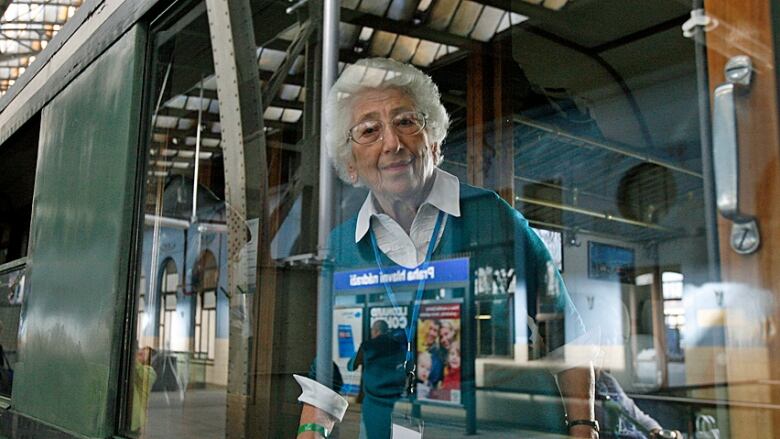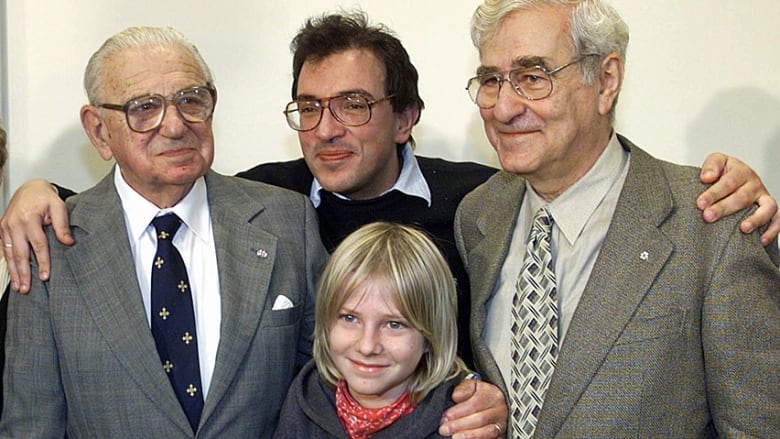Nicholas Winton: The man who saved children from Hitler
The CBC's Joe Schlesinger was one of 669 Jewish children rescued from the encroaching Nazis in 1939

Three quarters of a century ago today, on June 30, 1939, I travelled with my nine-year-old brother Ernie and more than 200 other kids under 17 through Nazi Germany in a train under armed guard as if we were a contagious cargo. I was 11.
We were sealed off so tightly that we were not even allowed to open the windows to get relief from the stifling air.
What made us so toxic was that just about all of us were Jews. We were, in a way, pawns in the opening rounds that eventually led to the Holocaust, the catastrophe that took the lives of most of the parents mine among them who put their children on that train to safety in Britain.
For all that, barely hours after the often tearful farewells from our parents, we found an opportunity, as children will, to have some fun.
In one of the German stations we passed through, we spotted a locomotive with a propeller at its nose.
Immediately, clumps of little boys, train buffs all, rushed to the windows to inspect and argue. Did the prop really pull the train or was it just decoration, another German propaganda ploy? Was it powered by a diesel engine or electricity? How fast could it go?
As eager for fun as we may have been, we were hardly unaware of the gravity of the situation we were in. We had heard Adolf Hitler's threatening rants on the radio, and the worries our parents expressed at the dinner table.
And we watched as the Nazis inched closer and closer until, just a few months earlier, they occupied and broke up Czechoslovakia, the country we all came from.
Hot cocoa
When the train finally crossed into Holland, you could feel the relief. The windows and doors were opened. The Dutch welcomed us with smiles, food and delicious hot cocoa.
That night, as we sailed across the English Channel to Dover, you could hear the doleful sound of children singing the Czech national anthem: "Kde Domov Muj? Kde Domov Muj?" Where is my home? Where is my home?
For many of us it would remain a question unanswered for years; and for those whose hearts are not where their feet are mired, it has stayed unanswered to this day.
For all our tribulations, though, our survival has been a triumph. Not just for us, but above all for our parents who on that June day so long ago gave their children life a second time.
Finding a country
We didn't know it at the time but our train wasn't the only one to make that journey. There were eight such transports.
The ninth, and largest, was to have left onSeptember 3. It didn't because the Second World War had just broken out. Almost all of the 251 children left behind that day perished during the war.
Still, the transports that did make it to England saved the lives of 669 boys and girls. Given the huge obstacles, that was a miracle.

The Nazis were not the main problem; they were willing, as they would put it, to get rid of Jews. The biggest problem was finding a country that would allow these refugees in.
With the joblessness of the Great Depression in full swing, the world had shut its doors to immigrants, and the situation only grew worse in 1938 as the Nazis grabbed other territory, creating an ever-growing horde of refugees.
At the same time, they escalated their attacks on Jews with Kristallnacht("The night of broken glass"), a massive pogrom across Germany in which 91 Jews were killed and 30,000 were shipped off to concentration camps. A thousand synagogues along with other Jewish property were destroyed.
I was 10 when that happened. From our home in Bratislava, the Slovak capital, I could see the Nazi flag fluttering on the other side of the Danube River Bridge that separated Czechoslovakia from what only a few months earlier had been an independent Austria.
I couldn't help wondering when that flag might cross the river.
Nicholas Winton
Throughout 1938 more and more refugees crowded into what was left of Czechoslovakia.
Increasingly, these lost souls ended up in miserable camps with little food and next to no heat to protect them from the increasingly cold weather.
That and a growing awareness that Hitler would soon gobble up the rest of the country added a sense of urgency to our plight.
Whatever would happen to the Nazis' political opponents, their families, while in trouble, would not be in danger of losing their lives.

For Jews it was different. The simple fact of being born a Jew irrevocably put us on Hitler's hit list.
So Jewish parents, aware by now that they were trapped, switched to trying to save their children. I learned mine did when I overheard my mother telling a friend that they were planning to send their sons abroad "until things blow over."
Whether she actually believed that they would blow over I will never know.
Trying to find a safe haven for children would not be easy. In addition to all the usual immigration problems, it involved the difficulty of finding people to take in youngsters and support them.
There were foreign volunteers in Prague eager to try. But as dedicated and hard-working as they were, they would not have succeeded had it not been for one man: Nicholas Winton.
What set him apart was that while the rest were mostly teachers and charity workers, Winton was a businessman, a London stockbroker, who knew how to organize, raise money, publicize, deal with bureaucracies and persuade people.
Moreover, he knew it couldn't be done from Prague. So while he left the volunteers there to deal with the parents and to press the Germans for exit permits, he returned to London to start his campaign.
'Nicky's children'
At the time, there were no regulations that would allow entry to unaccompanied children, so Nicky Winton first had to convince the British government to change its mind.
He succeeded, one of the conditions being the posting a bond that would make sure the children would not become a burden on the public purse.
Next, he had to find families to take in the children, and raise money to finance their transport. To do so, he advertised and placed articles in the press.
For people who expressed an interest in taking in a child, he prepared flash cards with the photos and particulars of the children to allow the families to choose.
Winton did all this under the guise of a fictional organization he created. He took the letterhead of a legally existing outfit, The British Committee for Refugees from Czechoslovakia, and reprinted it with an addition: Children's Section, Nicholas Winton, Honourary Secretary.

But Nicky's attempts to find other countries to let in "his" children apart from Sweden, which took in 20 failed.
On March 14, 1939, the first of his trains left Prague for England.
The next day, the Germans occupied the rest of the country and Hitler himself marched triumphantly into Prague with his troops.
The parents of the children left behind were now frantic. Fortunately, the Germans allowed the trains they calledKindertransportsto keep on rolling.
And that has left me here to tell the tale.
Uncovering the past
For 50 years we didn't know who had saved our lives. Winton himself was so modest he didn't even tell his wife what he had done. He felt he had done many things since then that were more meaningful to him.
When the war started he joined the Red Cross as an ambulance driver and was evacuated from the beaches of Dunkirk during the Allied retreat. He later returned to France as a Royal Air Force pilot.
After the war, he worked for various international organizations, among them the International Refugee Organization and the U.S. Marshall Plan, which helped fund the recovery of Western Europe from the ravages of the war.
In the 1950s, as a family man, he returned to the business world. But he never gave up on his good works. He helped establish Abbeyfield, a giant charity that runs hundreds of homes for the elderly throughout the U.K.
He also became involved with Mencap (The Royal Mencap Society), an organization that helps people with learning disabilities, and charities here and there as far as Brazil.
But hisKindertransportpast lay buried until one day, 50 years after his trip to Prague, his wife, Grete, came across a suitcase in their attic she hadn't noticed before.
When she opened it, she found it full of lists of names, photos of children, letters and telegrams. When he told her what they represented, she set out to discover what had happened to all those children.
Together again
Now that Nicky's secret was out in the open, it took on a life of its own. Honours rained down on him from on high, even from the heavens when a minor planet was named after him. On Earth, Queen Elizabeth knighted him.
The plaudits from around the world still have not stopped. The latest: a petition signed by more than 100,000 people nominating Sir Nicholas Winton for the Nobel Peace Prize.
In May, Winton celebrated his105thbirthday at a party that symbolized a more personal aspect of his celebrity. Of the 100 or so guests, most had been passengers on his trains along with their families.
They were there as part of an outpouring of gratitude and love from the Kindertransportchildren.
Nicky's humanitarian feat has become a highly emotional bond that has tied us not just to him but also to each other.
We have become "Nicky's children" in real life, a huge family that includes not just the 669 who were on his trains but also our children and their offspring, a group that now numbers more than 6,000.
For Nicky Winton, as well as for our parents who sacrificed and suffered so much, that is their ultimate victory over the evil that was Nazi Germany.












_(720p).jpg)


 OFFICIAL HD MUSIC VIDEO.jpg)
.jpg)



























































































